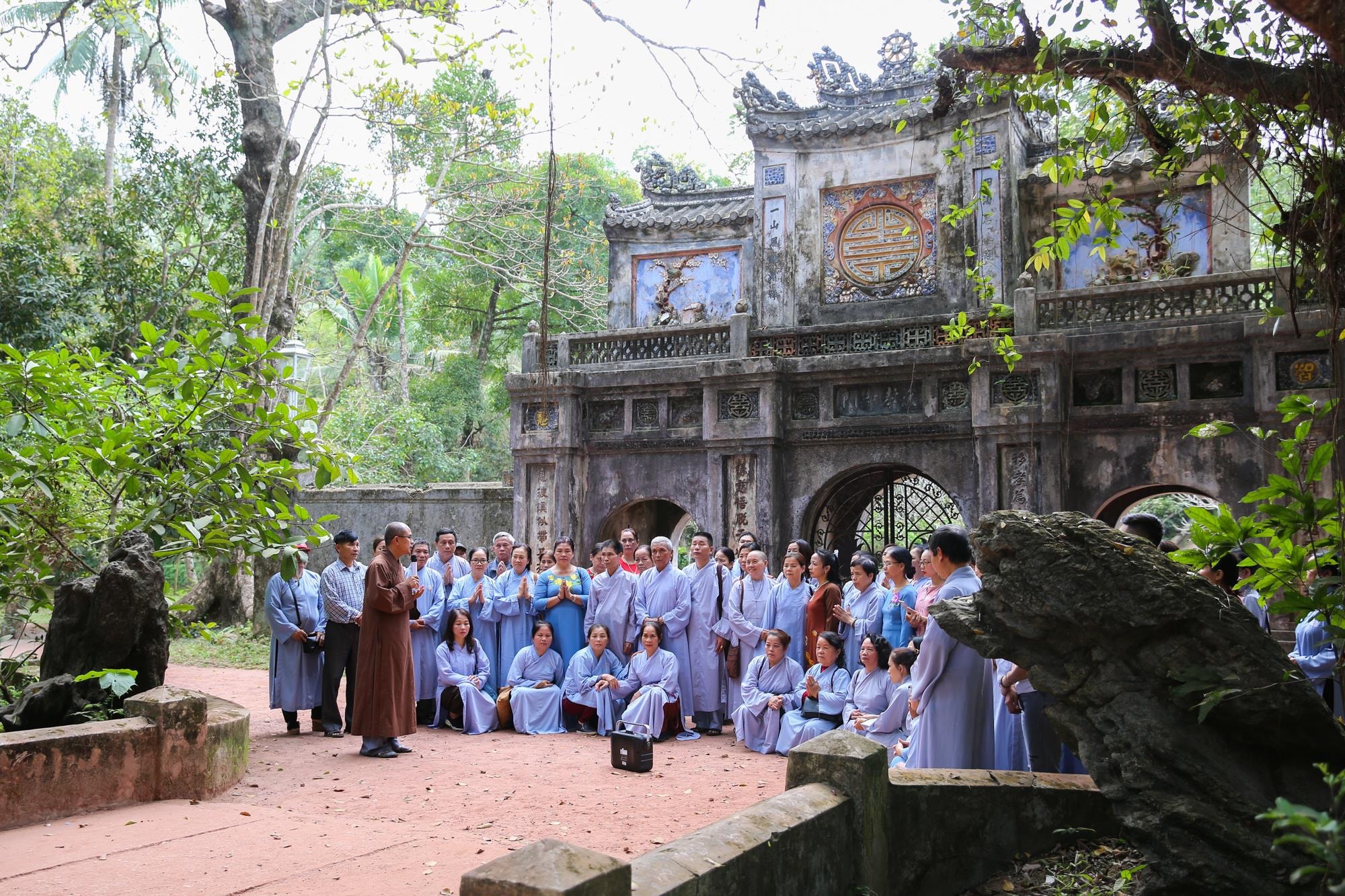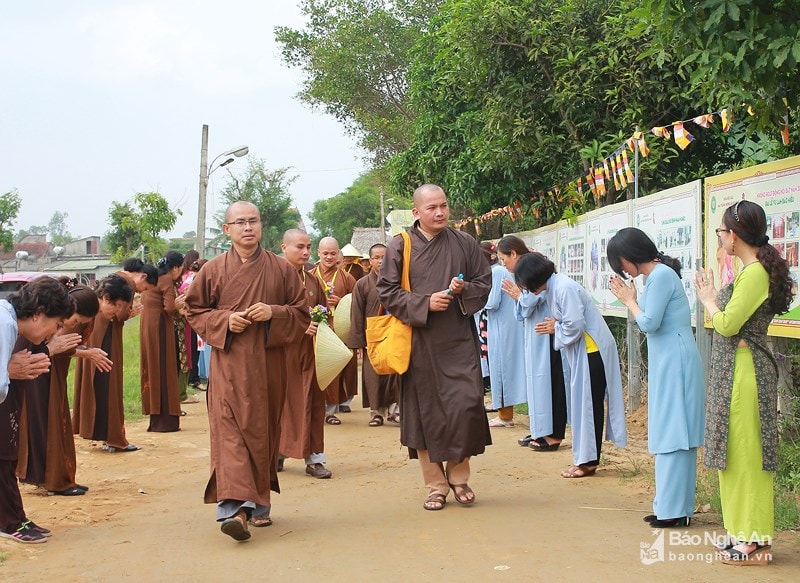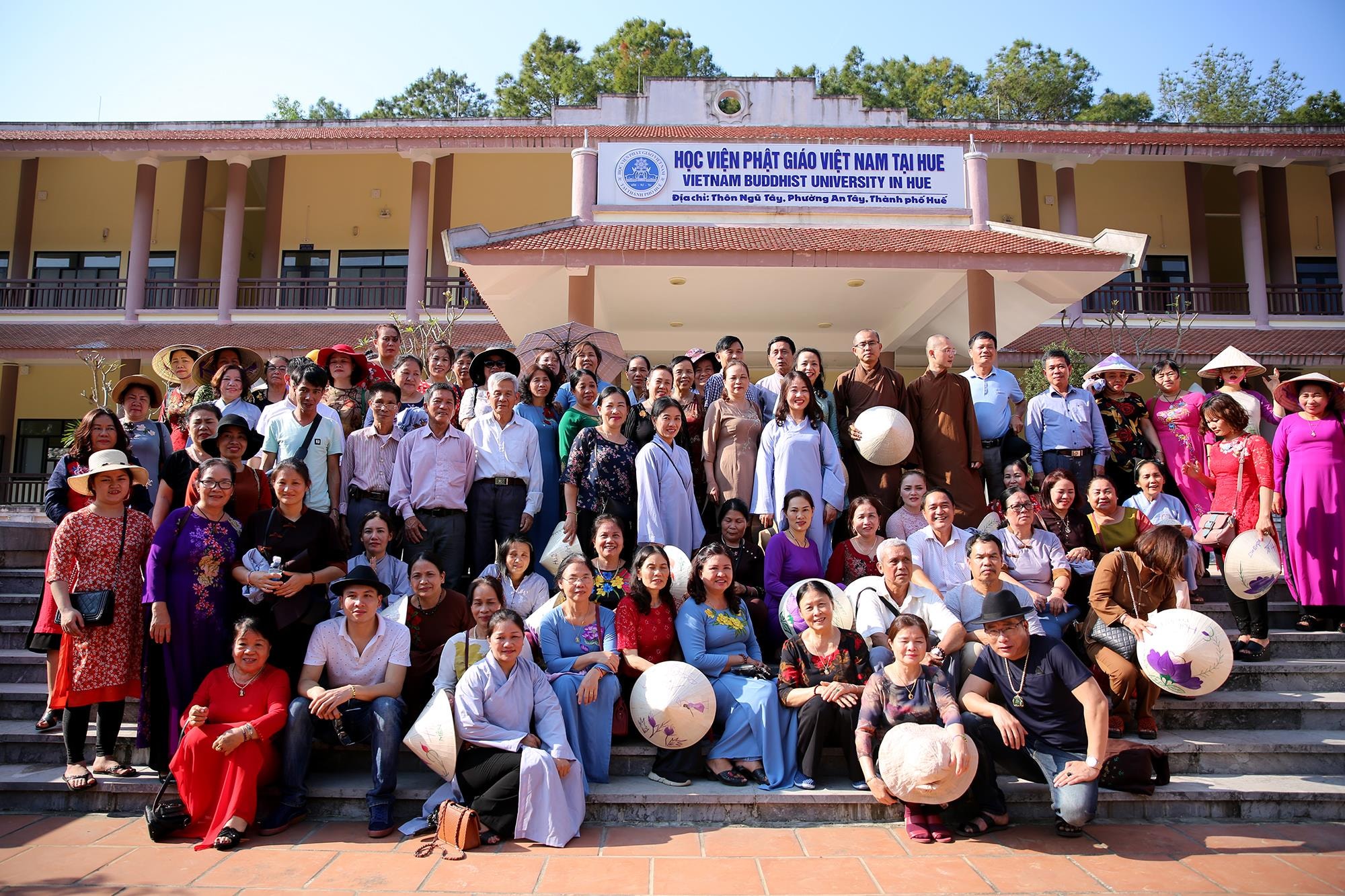Vietnamese Buddhism and the spirit of "protecting the nation and bringing peace to the people"
(Baonghean.vn) - Through many ups and downs, with its unique historical factors of formation and development, Buddhism in Vietnam has always accompanied and practically served the cause of protecting and developing the country.
Buddhism and the cause of building, protecting and developing the country
The diversity of Buddhist sects with their specific paths of practice is also a factor that meets the increasingly diverse needs of Buddhists and people so that the Dharma is increasingly connected with Life. Not only does it enrich the spiritual and religious life of the people, but it is also a way for Buddhism to develop more and more.
 |
| More than 100 Buddhists made a pilgrimage from Vinh City and neighboring areas to Tu Hieu Pagoda hoping to pay homage to Master Thich Nhat Hanh, the second most influential Buddhist leader in the West, after the Dalai Lama. Photo courtesy |
During the thousand years of Chinese domination, pagodas were places for community activities, monks were also the ones who taught people how to read and write, prescribed medicine to cure illnesses; taught people how to live according to good and right principles, how to love their country and their people, and nurtured the spirit of national independence. The country built a foundation of autonomy, Zen Master Ngo Chan Luu helped King Dinh Tien Hoang govern the country and bring peace to the people; confidently asserted independence and sovereignty in foreign relations with neighboring countries. In the pre-Le period, there was Zen Master Do Phap Thuan, especially Zen Master Van Hanh, who had great contributions to King Le Dai Hanh in the resistance war against the invading Song army and later, helped Ly Cong Uan ascend the throne, establishing the Ly Dynasty - a dynasty that took Buddhism as the national religion, built a peaceful and prosperous society, and took the well-being of the people's lives as the goal of governing the country.
 |
| Monks and Buddhists of Duc Hau Pagoda welcomed 150 monks and nuns from the Vietnam Buddhist Academy in Hue, led by Venerable Thich Thien Chi, to visit An Hau Pagoda. Photo courtesy |
During the two resistance wars against French colonialism and American imperialism, Buddhism was always a support for the revolution. Many pagodas became bases of activity, hiding places for revolutionaries. A large number of Buddhists, including lay people, actively participated in the resistance war for independence and national unification. Many monks temporarily put aside their religious practice, left the monastery, and went to the countryside to participate in the revolution, such as Venerables Thich Thien Chieu, Thich Minh Nguyet, Thich Thien Hao, Thich The Long... many monks heroically sacrificed their lives for the cause of national liberation.
 |
| Since the Buddhist filial piety festival, Vu Lan Festival has become a familiar event to many people, carrying the profound meaning of gratitude and filial piety of Eastern people. Photo: Ho Chien |
In particular, the event of Venerable Thich Quang Duc “burning himself for the Dharma” on June 11, 1963 in the middle of Saigon to protest the policy of oppressing Buddhism of the puppet government of Ngo Dinh Diem became a flame that lit up the conscience of the whole world, calling on the world to support Vietnam in the cause of national liberation. The image of the Venerable’s “Eternal Heart” carries the noble meaning of the worldly spirit of Vietnamese Buddhism. Buddhists are willing to sacrifice themselves for the cause of great solidarity, fighting for justice and peace.
That spirit continues to shine, multiplied throughout the resistance war against America, bringing the country back together and is inherited and developed in the cause of building and developing the country today.
“Religion - Nation - Socialism”
 |
| Over the past 20 years, the Vietnam Buddhist Academy in Hue has trained 9 courses with more than 1,000 monks and nuns graduating with a bachelor's degree in Buddhist studies. 30 monks and nuns from the Academy have now graduated with a doctorate in Buddhist studies; most of the monks and nuns who graduated from the Academy are currently propagating the Dharma, taking on important Buddhist activities at Central Committees and Institutes, in localities across the country as well as abroad. Photo courtesy |
"Only when the country is independent can Buddhism spread easily"President Ho Chi Minh affirmed this during his lifetime. During the process of accompanying the country, Buddhism has continuously developed, affirming its position as a major religion in Vietnam. The profound cultural and humanistic values of Buddhism have positively influenced the thoughts, ethics and lifestyles of the majority of people, contributing to the perfection of personal ethics, forming a gentle and tolerant lifestyle and contributing to the healthy development of social relations. The attitudes, ideological and philosophical values of Buddhism have blended with the national cultural tradition, becoming a precious heritage and identity of the Vietnamese people.
 |
| Venerable Thich Quang Bao - Standing Member, Head of the Cultural Committee of the Executive Committee of the Vietnam Buddhist Sangha of Nghe An province, discussed with delegates and Buddhists about Buddha's Enlightenment Day, Buddhist teachings, the spread of Buddhism in the world... Photo: Document |
There may still be some individuals and places of worship taking advantage of people's beliefs to commit illegal acts, affecting the reputation of Buddhism. These individual cases have been condemned by society and are being considered and properly handled by the government and relevant agencies to restore the dignity of Buddhism, so that people's religious beliefs are always enlightened by the spirit of compassion, charity, and forgiveness of Buddhism./.

